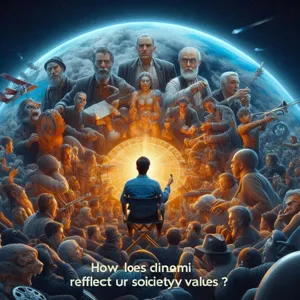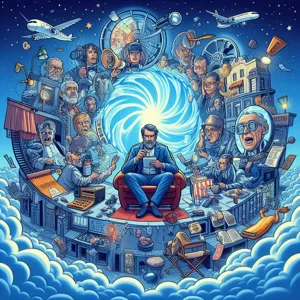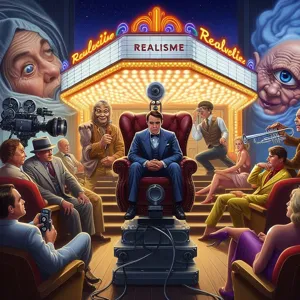Cinema has long served as a powerful lens through which we can examine the evolving tapestry of our societal values.
From the golden age of Hollywood to the diverse narratives of today, films have reflected our collective hopes, fears, and aspirations, often holding a mirror up to the culture of their times. Whether it’s the portrayal of gender roles, race relations, or the complexities of modern life, the stories we tell on screen resonate deeply with the realities we face off-screen. In “Reel Reflections: How Cinema Mirrors Our Societal Values,” we will embark on a thought-provoking journey through iconic films that have shaped and challenged our understanding of morality, community, and identity. By exploring these cinematic masterpieces, we can gain insight into how the silver screen not only entertains but also influences and reflects the dynamic values that define our society. Join us as we delve into the powerful intersection of filmmaking and cultural commentary, revealing the profound ways in which cinema continues to shape our worldview.
1. Introduction: The Connection Between Cinema and Society

In an age where screens dominate our lives, cinema has emerged as a powerful lens through which we can examine the complexities of our society. From the grandiose narratives of Hollywood blockbusters to the intimate storytelling of independent films, the movies we create and consume reflect our cultural norms, aspirations, and anxieties. This intricate connection between cinema and society is not merely coincidental; it is a dynamic interplay that has evolved over decades, mirroring the values, struggles, and triumphs of the human experience.
As we delve deeper into the world of film, we uncover how it serves as a cultural archive, preserving the zeitgeist of specific eras and encapsulating the prevailing attitudes towards issues such as race, gender, politics, and technology. For instance, films produced during the civil rights movement often tackled themes of equality and justice, providing a voice to marginalized communities and fostering a dialogue around societal change. Similarly, contemporary cinema continues to challenge and redefine traditional narratives, pushing boundaries and inviting audiences to reflect on their beliefs and biases.
In this exploration, we will examine how filmmakers, through their artistry, not only entertain but also provoke thought and inspire action. By analyzing a diverse array of films, we can better understand the ways in which cinema acts as a mirror, reflecting our societal values while simultaneously shaping them. Join us as we embark on this cinematic journey, uncovering the profound connections between the stories we tell on screen and the world we inhabit.
2. Historical Context: Cinema as a Reflection of Its Time
Cinema has long served as a powerful lens through which we can examine the societal values of its time, acting as both a mirror and a catalyst for change. From the golden age of Hollywood to the gritty realism of independent films, the evolution of cinema has paralleled significant historical events and cultural shifts, reflecting the attitudes, fears, and aspirations of society.
Take, for instance, the films produced during the Great Depression. Movies like “It Happened One Night” and “The Grapes of Wrath” provided escapism yet also confronted the harsh realities faced by millions. These narratives not only entertained but also offered commentary on economic struggles, class disparity, and the enduring spirit of the American people. Similarly, the post-World War II era brought forth films that grappled with issues of identity and the trauma of war, exemplified by classics like “The Best Years of Our Lives,” which explored the challenges faced by veterans reintegrating into civilian life.
The 1960s and 1970s marked a period of radical social change, and cinema became a conduit for the counterculture movement. Films like “Easy Rider” and “The Graduate” questioned traditional values and explored themes of rebellion against the establishment, reflecting the tumultuous spirit of a generation seeking to redefine itself.
As we move into the contemporary landscape, the rise of technology and globalization has influenced the stories we tell. Blockbusters like “Black Panther” and “Parasite” highlight the importance of representation and challenge prevailing narratives, prompting audiences to reevaluate historical injustices and current societal structures.
Thus, cinema is more than mere entertainment; it is a dynamic reflection of our collective consciousness. By studying the films of different eras, we can gain insight into the values, conflicts, and transformations that shape our world, making cinema not just a form of artistic expression but a vital historical document. As we continue to engage with film, we must recognize its power to mirror our society and provoke meaningful conversations about who we are and who we aspire to be.
3. The Role of Storytelling in Shaping Societal Values

Storytelling is the heartbeat of cinema, a powerful medium that transcends time and space, capturing the essence of human experience. Films serve not only as a source of entertainment but also as a reflection and shaper of societal values. Through the lens of storytelling, filmmakers have the unique ability to weave narratives that resonate deeply with audiences, often challenging prevailing norms and sparking critical conversations about issues that matter.
Consider the films that have left an indelible mark on society—works like “To Kill a Mockingbird,” which confronts racism and injustice, or “The Pursuit of Happyness,” which embodies the relentless spirit of resilience against adversity. These stories do more than entertain; they provoke thought, inspire empathy, and encourage viewers to examine their own beliefs and behaviors in the context of the broader social landscape.
Moreover, storytelling in cinema allows for the exploration of diverse perspectives. By presenting characters from varying backgrounds and experiences, filmmakers can shed light on the nuances of social issues, fostering understanding and compassion among viewers. For instance, films like “Moonlight” and “Parasite” challenge audiences to confront their biases and assumptions, ultimately fostering a more inclusive dialogue about race, class, and identity.
As societal values evolve, so too does the storytelling in cinema. Contemporary films often address pressing issues such as climate change, gender equality, and mental health, reflecting a growing consciousness within society. By tackling these subjects, filmmakers not only mirror current societal challenges but also inspire audiences to engage with and advocate for change.
In essence, the role of storytelling in cinema is multifaceted—it serves as both a mirror, reflecting the values and dilemmas of a society, and a catalyst for change, inspiring audiences to reconsider and reshape those very values. As we continue to engage with the stories told on screen, we are reminded of the profound impact cinema can have on our collective consciousness, shaping the world we live in and the values we hold dear.
4. Analyzing Popular Genres: What They Reveal About Culture
When we delve into the world of cinema, we find that the genres we gravitate towards often serve as powerful reflections of our societal values, aspirations, and anxieties. Each genre—whether it be horror, romance, science fiction, or drama—carries its own set of conventions, and through these, we can analyze what they reveal about the culture from which they emerge.
Take horror films, for instance. In recent years, the rise of psychological thrillers and supernatural horrors has highlighted a growing societal concern with mental health and the fear of the unknown. The chilling figures lurking in the shadows may not just represent monsters, but rather the very real anxieties we face in our everyday lives—fear of failure, societal rejection, and the loss of control. Films like “Get Out” and “Hereditary” delve deep into themes of identity and trauma, forcing viewers to confront uncomfortable truths.
On the other hand, romantic comedies often reflect the ideals and challenges of modern relationships. Through the lens of love, they address evolving gender roles, the impact of technology on dating, and the quest for personal happiness. Classics like “When Harry Met Sally” and more contemporary hits like “Crazy Rich Asians” reveal how cultural expectations shape our romantic endeavors, while also celebrating the diversity of love stories that exist within our society.
Science fiction, with its imaginative landscapes and futuristic technologies, serves as a canvas for our hopes and fears about the future. Films like “Blade Runner” and “Black Panther” not only entertain but also provoke critical discussions about ethics, identity, and social justice. These narratives often reflect our current struggles with issues like climate change, inequality, and the rapid advancement of technology, urging us to consider what kind of future we want to create.
Dramatic narratives, too, offer a lens through which we can examine the human condition. They often tackle heavy themes such as family dynamics, existential crises, and societal pressures. Movies like “The Pursuit of Happyness” and “Parasite” resonate deeply with viewers, as they explore the complexities of class disparity and the relentless pursuit of dreams, inviting audiences to empathize with characters whose lives may be vastly different from their own.
In essence, analyzing popular genres not only enhances our understanding of film as an art form but also reveals the underlying cultural currents that shape our collective consciousness. By examining the stories we tell and the characters we create, we can gain valuable insights into our societal values, fears, and aspirations—an everlasting dialogue between cinema and culture that continues to evolve with each passing year.
5. Case Study: Iconic Films and Their Societal Impact

### 5. Case Study: Iconic Films and Their Societal Impact
Throughout the history of cinema, certain films have emerged as cultural touchstones, reflecting and often shaping the societal values of their time. One of the most poignant examples is *To Kill a Mockingbird* (1962), directed by Robert Mulligan. Based on Harper Lee’s seminal novel, this film serves as a powerful critique of racial injustice in America. Set in the deep South during the 1930s, it portrays the moral awakening of a young girl, Scout Finch, as her father, Atticus, defends a black man falsely accused of raping a white woman. The film not only highlights the pervasive racism of the era but also promotes themes of empathy and integrity, encouraging audiences to confront their own biases.
Similarly, *The Graduate* (1967) captures the disillusionment of the post-war generation, exploring themes of existential angst and societal expectation. As Benjamin Braddock, played by Dustin Hoffman, grapples with the pressures of adulthood and the hollow promises of the American Dream, the film resonated deeply with a cohort questioning traditional values. Its iconic line, “Plastics,” has since become a metaphor for the superficiality of consumer culture, urging viewers to reflect on what truly matters in life.
Moving into the 21st century, films like *Black Panther* (2018) have made significant strides in representing marginalized voices while challenging stereotypes. The film not only broke box office records but also sparked conversations around race, identity, and the importance of representation in Hollywood. It showcased a powerful vision of African culture and technological advancement, allowing audiences to explore the complexities of heritage and the impact of colonialism in a contemporary context.
These films, among many others, illustrate how cinema serves as a mirror to society, reflecting its values, challenges, and triumphs. They not only entertain but provoke thought and inspire change, urging audiences to engage critically with the world around them. As we continue to explore the intersection of film and society, it’s clear that cinema remains a vital medium for both reflection and transformation.
6. Representation and Diversity: Reflecting Modern Values
In an era where societal values are continually evolving, cinema has become a powerful platform for representation and diversity, mirroring the rich tapestry of human experience. Modern audiences are no longer satisfied with one-dimensional characters or stories that fail to encapsulate the complexities of the world we live in. Instead, they demand narratives that resonate with a multitude of backgrounds, identities, and perspectives.
This shift in audience expectation has prompted filmmakers to prioritize inclusive storytelling, bringing forth characters and narratives that reflect the diversity of real life. From Hollywood blockbusters to independent films, we are witnessing an increase in stories told from the viewpoints of marginalized communities, LGBTQ+ individuals, and people of varying ethnicities and abilities. These stories not only enrich the cinematic landscape but also foster empathy and understanding among viewers, creating a shared space where differences are celebrated rather than sidelined.
Moreover, representation in cinema serves a dual purpose: it empowers underrepresented groups by providing them with visibility and voice, while simultaneously educating mainstream audiences about experiences that may be entirely foreign to them. For instance, films like “Black Panther” and “Crazy Rich Asians” have not only achieved commercial success but have also sparked conversations about cultural identity, heritage, and the importance of seeing oneself reflected on the screen.
As we navigate the complexities of our modern society, the call for authentic representation in cinema is more urgent than ever. It is a reflection of our collective values, emphasizing the need for inclusivity, understanding, and respect for all voices. By supporting diverse narratives, we are not only enriching our cinematic experiences but also participating in a broader cultural conversation that champions equality and acceptance. As filmmakers continue to embrace this responsibility, audiences can look forward to a future of storytelling that is as varied and vibrant as the world itself.
7. The Influence of Documentaries on Public Perception

Documentaries have long held a unique position within the cinematic landscape, serving as both a mirror and a magnifying glass that reflects and amplifies societal values. Unlike traditional narratives that embellish reality with fiction, documentaries delve into the heart of real-world issues, revealing truths that can inspire, provoke, and even challenge our preconceived notions. As viewers engage with these powerful narratives, they often find themselves grappling with complex topics such as social justice, environmental conservation, and political turmoil.
Take, for instance, the impact of films like “Blackfish” or “The Social Dilemma.” These documentaries not only educate audiences about pressing issues—like the ethical treatment of animals in captivity or the psychological effects of social media—but they also galvanize public sentiment and prompt discussions that ripple through communities and beyond. The visceral storytelling and real-life testimonies serve to humanize statistics, transforming abstract concepts into relatable stories that resonate with viewers on a personal level.
Moreover, documentaries wield the power to shape public perception by providing a platform for marginalized voices. By showcasing the lived experiences of individuals often overlooked in mainstream media, these films illuminate injustices and foster empathy, prompting audiences to reconsider their values and beliefs. The ripple effect can be profound; a single documentary may spark movements, influence policy decisions, or inspire collective action, proving that cinema can be a catalyst for change.
In an era marked by misinformation and polarized viewpoints, the role of documentaries has become increasingly vital. They not only hold a mirror to society but also challenge viewers to reflect on their own beliefs and the world around them. As audiences continue to engage with these real-life narratives, the influence of documentaries on public perception remains a testament to the power of storytelling in shaping societal values and driving meaningful conversations.
8. Cinema as a Tool for Social Change
Cinema has long been a powerful medium not just for entertainment, but as a catalyst for social change. From the early days of silent films to today’s blockbuster epics, the silver screen has the unique ability to reflect societal values and, equally importantly, to challenge and reshape them. Films can shine a light on pressing social issues, provoking discussions that ripple through communities and spark movements.
Consider the impact of films like “12 Years a Slave” or “Philadelphia,” which confront the painful realities of racism and the AIDS epidemic, respectively. These narratives humanize complex issues, compelling audiences to empathize with characters who embody struggles often relegated to the margins of public consciousness. By drawing viewers into these stories, cinema encourages a deeper understanding and motivates action, whether it be advocacy, activism, or simply fostering dialogue.
Moreover, cinema has the power to amplify voices that are often silenced in mainstream discourse. Independent filmmakers and diverse storytellers bring forth perspectives that challenge the status quo, inviting viewers to reconsider preconceived notions and societal norms. Films like “Moonlight” and “Parasite” not only entertain but also dismantle stereotypes, revealing the multifaceted nature of identity and class struggles.
In an era where social media dominates our lives, cinema continues to wield remarkable influence. Documentaries like “The True Cost” expose the dark underbelly of fast fashion, urging consumers to reflect on their purchasing behaviors and the ethical implications behind them. As audiences engage with these narratives, they are often inspired to drive change in their own lives, supporting sustainable practices and advocating for justice.
Ultimately, cinema serves as a mirror, reflecting the world as it is while simultaneously holding up a vision of what it could be. It reminds us of our collective humanity, urging us to recognize our responsibilities towards one another and the planet. As we watch these stories unfold, we are challenged not just to witness, but to be active participants in the ongoing narrative of societal evolution. Whether through laughter, tears, or moments of introspection, film has the profound ability to inspire change and foster a sense of unity amidst the diversity of our experiences.
9. The Role of Film Festivals in Highlighting Societal Issues
Film festivals play a pivotal role in not only celebrating cinematic artistry but also in shining a spotlight on pressing societal issues that resonate with audiences worldwide. These vibrant gatherings serve as a platform for filmmakers to present their stories, often illuminating themes of social justice, inequality, and cultural identity. By showcasing diverse narratives, film festivals become a powerful conduit for conversation and reflection, encouraging audiences to grapple with the complexities of the human experience.
Take, for example, the Cannes Film Festival, where films often address urgent global challenges, from climate change to gender inequality. Many independent films showcased here have the ability to evoke powerful emotions and spark dialogue, encouraging viewers to reconsider their own perspectives and the world around them. Similarly, festivals like Sundance and Toronto International Film Festival prioritize the inclusion of marginalized voices, ensuring that stories that might otherwise go unheard gain the recognition they deserve.
Moreover, these events foster networking and collaboration among filmmakers, activists, and audiences, creating a community that thrives on shared values and mutual understanding. Panel discussions and Q&A sessions often accompany screenings, providing a space for deeper exploration of the issues at hand. This interaction not only educates audiences but also cultivates empathy, allowing people to connect with experiences outside their own.
In an age where media can shape public discourse, film festivals stand as vital platforms for advocacy, pushing societal issues to the forefront of cultural conversations. They inspire change by motivating viewers to take action, whether it be through supporting causes, participating in community initiatives, or simply becoming more informed citizens. Ultimately, film festivals not only celebrate the art of cinema but also serve as a mirror, reflecting the values and challenges of our society and compelling us to engage with them meaningfully.
10. Audience Reception: How Viewers Interpret Cinema
Audience reception plays a pivotal role in understanding how cinema reflects and shapes societal values. Each film is not merely a product of its creators but also a canvas upon which viewers project their own beliefs, experiences, and cultural backgrounds. This interplay between film and audience can reveal profound insights into the collective psyche of a society at any given moment.
When a film is released, it is often met with a spectrum of interpretations. One viewer may see a romance blossoming in the backdrop of political turmoil, while another might focus on the film’s critique of social norms. These varied interpretations highlight the unique lens through which each audience member engages with the story. Factors such as age, gender, socioeconomic status, and cultural heritage all influence how an individual perceives the narrative, characters, and themes presented on screen.
Take, for instance, a movie that tackles issues of racial inequality. For some viewers, the film may resonate deeply, mirroring their own struggles and aspirations; for others, it might provoke discomfort or denial, reflecting a different set of societal values. This divergence in reception can spark important conversations about the underlying issues depicted in the film, encouraging audiences to confront their own beliefs and biases.
Moreover, the rise of social media has transformed audience reception into a dynamic dialogue. Platforms like Twitter and Instagram allow viewers to share their thoughts and feelings in real-time, creating a communal space for discussion and debate. This instant feedback loop not only shapes the perception of the film but can also influence its box office success and cultural impact. A film that resonates with audiences can ignite movements, inspire change, or even challenge the status quo, demonstrating the power cinema wields in shaping societal values.
Ultimately, the way viewers interpret cinema is a reflection of their own realities, making audience reception a crucial element in the ongoing conversation about how film mirrors, molds, and sometimes even disrupts the values of society. By examining this relationship, we gain deeper insights into not just the films themselves, but also the cultural landscape in which they are created and consumed.
11. The Impact of Technology on Storytelling and Values
In an age where technology evolves at a breakneck pace, its influence on storytelling and the values portrayed in cinema is more profound than ever. From the advent of sound in film to the dazzling spectacles of CGI, technology has not only enhanced the visual experience but also transformed the narratives we tell. Filmmakers now have unprecedented tools at their disposal, allowing them to craft immersive worlds that capture the imagination in ways previously thought impossible.
However, this technological advancement brings with it a duality: while it opens up new avenues for creativity, it also challenges the authenticity of the narratives being told. The rise of digital effects often leads to a reliance on spectacle over substance, where the dazzling visuals can overshadow the core messages of a story. In many cases, this results in a cinematic landscape that prioritizes entertainment value, sometimes at the expense of deeper societal reflections.
Yet, despite these challenges, technology also serves as a powerful medium for amplifying voices that have long been marginalized. Streaming platforms, social media, and digital filmmaking have democratized the industry, enabling diverse storytellers to share their unique perspectives. This shift allows for a richer tapestry of narratives that more accurately reflect the complexities of our society. Films that tackle critical issues—such as climate change, social justice, and mental health—are now more accessible, resonating with audiences and sparking important conversations.
Moreover, the way we consume media has also changed dramatically. The binge-watching culture of streaming services has altered our relationship with storytelling, leading to a demand for more intricate plots and character development. As viewers engage in prolonged narratives, they develop a deeper connection to the values and moral dilemmas presented on-screen. This shift not only reflects but also shapes societal values, as audiences increasingly seek stories that resonate with their own experiences and aspirations.
In essence, the impact of technology on storytelling is a double-edged sword. It challenges creators to balance innovation with authenticity while providing them with the means to explore and reflect societal values in ways that are both engaging and thought-provoking. As we navigate this evolving landscape, it becomes essential to recognize how these technological advancements influence not just the stories we tell but the values we hold dear as a society.
12. Future Trends: What Cinema May Say About Tomorrow
As we gaze into the cinematic crystal ball, it becomes increasingly clear that the future of film will be a compelling reflection of our evolving societal values and concerns. The films of tomorrow are likely to delve deeper into pressing issues such as climate change, social justice, and technological advancements, mirroring the transformative changes taking place in our world.
With a growing emphasis on representation and inclusivity, future cinema may showcase a diverse array of voices and stories that challenge traditional narratives. Expect to see an influx of films that not only highlight underrepresented communities but also explore the intricacies of identity in an increasingly interconnected world. As filmmakers embrace new storytelling techniques and formats—such as virtual reality and interactive narratives—we may witness a revolutionary shift in how audiences engage with content, inviting them to become active participants in the cinematic experience.
Moreover, as we navigate a rapidly changing technological landscape, cinema will likely reflect our complex relationship with innovation. Stories that grapple with the ethical implications of artificial intelligence, surveillance, and digital privacy may become more prevalent, prompting audiences to reflect on the societal ramifications of our reliance on technology.
As we project into this future, it’s clear that cinema will continue to serve as a mirror, not just reflecting societal values but also shaping them. By exploring uncharted themes and challenging the status quo, filmmakers can inspire dialogue and encourage audiences to ponder the world they want to create. In this way, the films of tomorrow will not only entertain but also empower, urging us to reflect, adapt, and envision a brighter future.
13. Conclusion: The Lasting Legacy of Film on Society
As we draw the curtain on our exploration of cinema’s profound impact on society, it becomes evident that the legacy of film extends far beyond mere entertainment. Movies have the unique ability to encapsulate, challenge, and reflect the values of the times in which they are created. From the early days of silent films to today’s blockbusters, each frame tells a story not just of characters and plots, but of cultural shifts, societal struggles, and collective hopes.
Throughout our journey, we’ve seen how films act as a mirror, reflecting the hopes and fears of different generations. They have the power to spark conversations, inspire movements, and even reshape public opinion. A film can galvanize audiences to reevaluate their beliefs, challenge the status quo, or embrace new perspectives, all while providing a shared experience that unites viewers across diverse backgrounds.
In this way, cinema becomes a historical document, capturing the zeitgeist of its era while influencing future generations. As we move forward, it’s crucial to recognize that the films we create today will shape the narratives of tomorrow. As filmmakers and audiences alike, we hold a responsibility to harness the power of storytelling to foster understanding, empathy, and social change.
Ultimately, the lasting legacy of film lies in its ability to connect us—both to our own experiences and to the wider human condition. As we continue to navigate the complexities of modern life, let us remember that cinema is not just a reflection of society; it is a catalyst for transformation. Through the lens of film, we can envision a world that is more inclusive, compassionate, and aware, ensuring that the stories we tell today resonate for generations to come.
14. Call to Action: Engaging with Cinema to Foster Critical Reflection
As we explore the profound relationship between cinema and societal values, it’s essential to recognize our role as viewers in this dynamic dialogue. Movies are not merely entertainment; they serve as powerful lenses through which we can examine our beliefs, biases, and the cultural narratives that shape our world. This is where our call to action comes in: engaging with cinema not just as passive spectators, but as active participants in a critical reflection of our society.
To foster this engagement, start by choosing films that challenge your perspectives. Seek out indie films, international cinema, and documentaries that tackle pressing social issues and offer diverse viewpoints. These narratives can illuminate the complexities of human experiences that mainstream media often overlooks, urging us to question our assumptions and expand our understanding of the world.
Additionally, consider forming discussion groups or film clubs where you can share insights and interpretations with others. This collaborative approach not only enhances your viewing experience but also encourages a deeper analysis of the themes and messages presented on screen. Invite friends or colleagues to join you in watching films that spark conversations about morality, identity, and justice, facilitating a rich exchange of ideas.
Moreover, leverage social media platforms to share your thoughts on films that resonate with you. Writing reviews or starting threads about specific scenes can create a ripple effect, prompting others to reflect on their own views. By becoming vocal advocates for films that challenge societal norms, you contribute to a culture of critical thinking and awareness.
Finally, don’t hesitate to support filmmakers and projects that prioritize social justice and representation. Your viewership and financial support can amplify marginalized voices and narratives that desperately need to be heard. Encourage others to do the same, creating a community of conscious consumers who value cinema as a tool for societal reflection and change.
In embracing this call to action, we can leverage the power of cinema not only to entertain but also to inspire, educate, and foster meaningful dialogue about the values that shape our lives. Let’s watch, discuss, and reflect—together.
15. Recommended Films That Reflect Societal Values
Cinema has an extraordinary ability to encapsulate the zeitgeist of its time, offering profound insights into the values, struggles, and triumphs of society. Here are some recommended films that not only entertain but also serve as compelling mirrors to the societal values of their respective eras.
**1. *To Kill a Mockingbird* (1962)**
Based on Harper Lee’s Pulitzer Prize-winning novel, this classic film delves into themes of racial injustice and moral growth. Set in the Deep South during the 1930s, it illustrates the complexities of human behavior and empathy through the eyes of a young girl, Scout Finch. The film is a poignant reminder of the enduring struggle for equality and the importance of standing up against prejudice.
**2. *Schindler’s List* (1993)**
Steven Spielberg’s powerful portrayal of the Holocaust tells the true story of Oskar Schindler, a man who saved over a thousand Jewish refugees during World War II. This harrowing film serves as a stark reflection on the depths of human cruelty and the incredible capacity for compassion. It forces viewers to confront the moral dilemmas of their own lives and the impact of individual actions in the face of systemic evil.
**3. *The Pursuit of Happyness* (2006)**
This inspiring film, based on the true story of Chris Gardner, highlights themes of perseverance, determination, and the American Dream. As Gardner struggles with homelessness while caring for his young son, the film underscores the importance of hope and resilience in the pursuit of a better life. It resonates deeply with contemporary societal values surrounding personal responsibility and the quest for opportunity.
**4. *Parasite* (2019)**
Bong Joon-ho’s Oscar-winning masterpiece is a darkly comedic commentary on class disparity and social stratification. Through the story of two families from vastly different socioeconomic backgrounds, it explores the lengths to which individuals will go to improve their circumstances. The film serves as a stark reflection of the widening gap between the wealthy and the impoverished, prompting discussions about privilege and inequality in modern society.
**5. *Moonlight* (2016)**
This coming-of-age story beautifully captures the complexities of identity, sexuality, and the search for belonging. Following the life of a young Black man named Chiron, the film addresses themes of masculinity, love, and the impact of environment on personal growth. It resonates with contemporary discussions about race, gender, and the struggles of marginalized communities, making it a powerful reflection of today’s societal values.
Each of these films offers not only entertainment but also a lens through which we can examine and reflect upon our collective values. They encourage audiences to engage in meaningful conversations about the issues that shape our societies, ultimately reminding us of the power of storytelling in understanding and navigating the human experience.
As we wrap up our exploration of how cinema serves as a powerful mirror reflecting our societal values, it’s clear that films are much more than mere entertainment; they are a profound commentary on the world we inhabit. From the themes we resonate with to the characters we empathize with, our collective narratives shape and are shaped by the cinematic landscape. By understanding the messages embedded in our favorite films, we can gain deeper insights into the cultural, social, and ethical dilemmas we face as a society. So, the next time you settle in for a movie night, take a moment to reflect on the themes and values being portrayed on screen. Cinema is not just a window to escape reality—it’s a lens that allows us to engage meaningfully with the world around us. Thank you for joining us on this journey through the reel reflections of our society!






